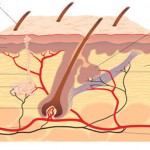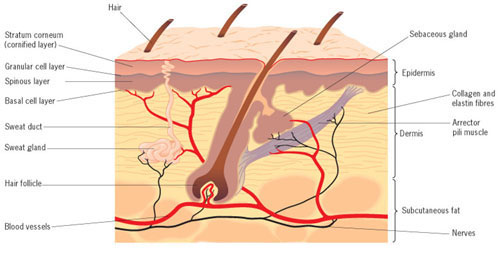In my previous post, I discussed the functions and features of different forms of vitamin A. So why is vitamin A important if you have acne?
 Well, we know that retinol (known commonly as vitamin A) is responsible for healthy keratinisation of the skin. In other words, it is important to the normal shedding of the skin cells that line the walls of the hair follicle—where acne arises from. Skin cells are ‘born’ in the epidermis, the deepest layer of the skin. Maturation of the skin cells occurs as they migrate up from the epidermis to the top layers of the skin. Since retinol controls the turnover of epithelial cells, having enough of this vitamin is important to those who have a dysfunctional rate of turnover. Acne and psoriasis both involve excessively rapid turnover of skin cells lining the follicle walls. This is termed hyper-keratinization. This process means that cells can build up, causing obstruction of the pore, and ultimately, an acne lesion, or the plaques of psoriasis.
Well, we know that retinol (known commonly as vitamin A) is responsible for healthy keratinisation of the skin. In other words, it is important to the normal shedding of the skin cells that line the walls of the hair follicle—where acne arises from. Skin cells are ‘born’ in the epidermis, the deepest layer of the skin. Maturation of the skin cells occurs as they migrate up from the epidermis to the top layers of the skin. Since retinol controls the turnover of epithelial cells, having enough of this vitamin is important to those who have a dysfunctional rate of turnover. Acne and psoriasis both involve excessively rapid turnover of skin cells lining the follicle walls. This is termed hyper-keratinization. This process means that cells can build up, causing obstruction of the pore, and ultimately, an acne lesion, or the plaques of psoriasis.
Vitamin A and Sebum Production: The other function of vitamin A as it related to skin health is regulation of sebum production. Sebum is an oily substance produced by the sebaceous glands, which are adjacent to each hair follicle. Acne occurs more easily in individuals who have overactive sebaceous glands because the sebum acts like ‘fly paper’, where bacteria and yeasts can get stuck. The immune cells attempt to solve the problem, but to no avail. The result is inflammation—identifiable by swelling, redness, heat and pain. So, it makes sense that acne sufferers would want to reduce their sebum production—which vitamin A (retinoids) can help them accomplish.
In fact, retinoids have worked so well for some acne sufferers that dermatologists have been prescribing them for decades. However, both the topical and oral use of these synthetic versions of vitamin A have side effects, including but not limited to excessive drying of the skin, and a worsening of acne before improvement occurs. Could the fact they are synthetic versions of an essential vitamin, used in high doses, be the reason for these side effects?
So, should you take a natural vitamin A supplement for your acne? Stay tuned for Part 3, in which I’ll tell you who should NOT use vitamin A supplements and why.
